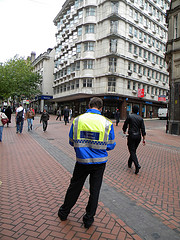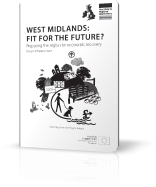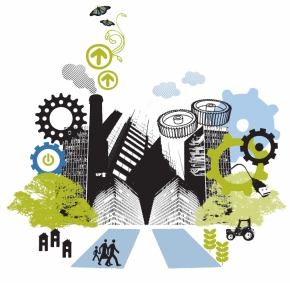Last week I attended the annual SCPnet conference in the West Midlands. SCPnet stands for Sustainable Consumption and Production network and is a partnership network dedicated to promoting the philosophy of sustainable consumption and production (SCP) at a sub-national level.
I must say that I found the conference very interesting and insightful and the quality of the speakers was outstanding. This conference gave me a great opportunity to reflect on what is sustainable consumption and production, its importance, and how it links to the low carbon work we are doing at the Observatory.
Sustainable consumption and production
‘Securing the Future’, the UK Government sustainable development strategy, states:
‘Increasing prosperity, in the UK and across the world, has allowed many people to enjoy the benefits of goods and services which were once available to just a few. Nevertheless, the environmental impacts from our consumption and production patterns remain severe, and inefficient use of resources is a drag on the UK’s economy and business. We need a major shift to deliver new products and services with lower environmental impacts across their life cycle, while at the same time boosting competitiveness. And we need to build on people’s growing awareness of social and environmental concerns, and the importance of their roles as citizens and consumers.’ (DEFRA (2005) Securing the Future, p.43)
An alternative definition by Constanza (2000) says:
‘Probably the most challenging task facing humanity today is the creation of a shared vision of a sustainable and desirable society, one that can provide permanent prosperity within the biophysical constraints of the real world in a way that is fair and equitable to all of humanity, to other species, and to future generations. This vision does not now exist, although the seeds are there.’
Sustainability and the low carbon economy
So going back to the question in the title, are sustainability and low carbon the same thing? I believe the answer is no.
The West Midlands Regional Observatory recently published the research The Low Carbon Economy in the West Midlands. The research highlights that a low carbon economy is one where businesses deliver products and services while reducing their level of carbon emissions.
In this sense, the low carbon economy is just one element (an import one) of sustainability. In the same way that the environment is much more than only carbon emissions, sustainability is much more than just environmental issues.
Climate change, carbon emissions, environment impacts, social issues, waste, recycling, population growth, lifestyles, supply chain, energy, environment quality and deprivation are just a few examples of topics that have an impact on sustainability.
Also, businesses, government, people and the third sector must all work together. Sustainability is not something it can be delivered by only a few people in isolation.
In 2006 the report I will if you will presented the ‘triangle of change,’ a framework where people, business and government interact in a coordinated effort to move towards a more sustainable society.

If you want to know more about sustainable consumption and production, here are some websites that can help:
We are planning to add more posts about the 2010 SCPnet Conference soon. If you’re interested keep an eye on this blog.
Filed under: Environment, Low carbon, Population & Society, Sustainable communities, Sustainable development | Tagged: climate change, environment, low carbon economy, SCPnet, sustainability, sustainable consumption, sustainable production | Leave a comment »





 Can we use a mix of indicators to show which of our communities are sustainable?
Can we use a mix of indicators to show which of our communities are sustainable?
 The
The  A couple of weeks ago I attended ‘Voices from the future 2020: how are we housed?’, an event organised by
A couple of weeks ago I attended ‘Voices from the future 2020: how are we housed?’, an event organised by  Support the community organisations who are working on the ground, was a strong theme in both workshops on ‘engaging communities in the new economy’ at the Observatory’s
Support the community organisations who are working on the ground, was a strong theme in both workshops on ‘engaging communities in the new economy’ at the Observatory’s  The 2009 Observatory conference,
The 2009 Observatory conference, 
 One month to go until the Observatory’s 2009 conference –
One month to go until the Observatory’s 2009 conference – 
 Results of the first
Results of the first 


